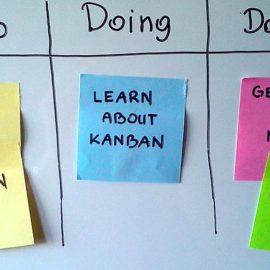

This article is an excerpt from the Shortform book guide to "Public Speaking for Success" by Dale Carnegie. Shortform has the world's best summaries and analyses of books you should be reading.
Like this article? Sign up for a free trial here.
What should (and shouldn’t) you eat before a presentation? How should you prepare the stage?
If you have a presentation coming up, you know you must figure out what to say and how to say it. But, that’s not the only preparation you should do. Dale Carnegie suggests that, in the hours and moments leading up to your talk, you must turn your attention to several external and last-minute elements.
Read more to learn what to do before a presentation, according to Carnegie’s classic book Public Speaking for Success.
What to Do Before a Presentation
Having put in the work to prepare for your speech, you’ll want to be ready for the big day. Carnegie shares some practical advice on what to do before a presentation. First, he says that you should rest up before your speech: Get a good night’s sleep to rejuvenate mentally, physically, and emotionally. Also, to prevent brain fog, don’t eat before speaking.
(Shortform note: In contrast to Carnegie’s suggestion, it may be that you should avoid certain foods rather than food in general. Some foods, largely those that cause a spike in blood sugar, cause more brain fog than others—sugary foods, breads, heavy meats, and dairy are the common culprits. Instead, start the day with healthy fats from avocados, nut butters, or whole nuts, as well as unrefined sugars from whole fruits and berries. Eat lightly of these options, and you’ll avoid the spiked blood sugar that causes mental fatigue while also getting enough slow-burning energy to deliver an excellent speech.)
Just prior to the day of, you’ll want to make sure the stage is properly prepared. Carnegie advises removing all clutter and furniture, apart from an unobtrusive podium, to minimize distractions. If you don’t have a stage, simply clear the area you’ll be occupying of clutter—and know that speaking from the same level as your audience makes the event more personal and comfortable.
As to the room itself, try to match its size to your audience. For a small audience, book a small room; book a large room for a larger audience. If audience members are sparse and scattered, Carnegie says you can ask them to gather in the center. This helps facilitate a crowd mentality, which makes people easier to engage with and persuade.
(Shortform note: Carnegie’s tips to match your room to your audience may serve to effect deindividuation, a phenomenon identified by researchers of crowd psychology wherein members of large crowds have a lessened sense of self and individual identity. This can have a variety of effects, such as causing people to be more likely to go along with crowd norms. So if your enthusiasm successfully reaches a few audience members, others will more easily join in the general excitement and agreement that they feel.)
Carnegie advises that, right before the speech, you should dress and groom yourself well. Looking the part will help you deliver as well as impress your audience. Right before you take the stage, read your speech over once more, and rehearse what you’ve memorized.
(Shortform note: Research confirms that how you dress affects both how you feel and how others perceive you. Specifically, people were found to make snap judgments in three seconds or less based on the clothing worn by the study’s models, even with faces blurred. Based on whether their suits were fitted and tailored or off-the-rack, participants rated the former as more confident, high-earning, flexible, and successful. Given this, be sure to consider all the little details of your outfit—even a small bit of frumpiness could negatively affect people’s perception of you.)

———End of Preview———
Like what you just read? Read the rest of the world's best book summary and analysis of Dale Carnegie's "Public Speaking for Success" at Shortform.
Here's what you'll find in our full Public Speaking for Success summary:
- Why public speaking is one of the most important skills to have
- How to overcome the fear of public speaking and adopt poise
- How to research, write, and deliver a memorable speech






